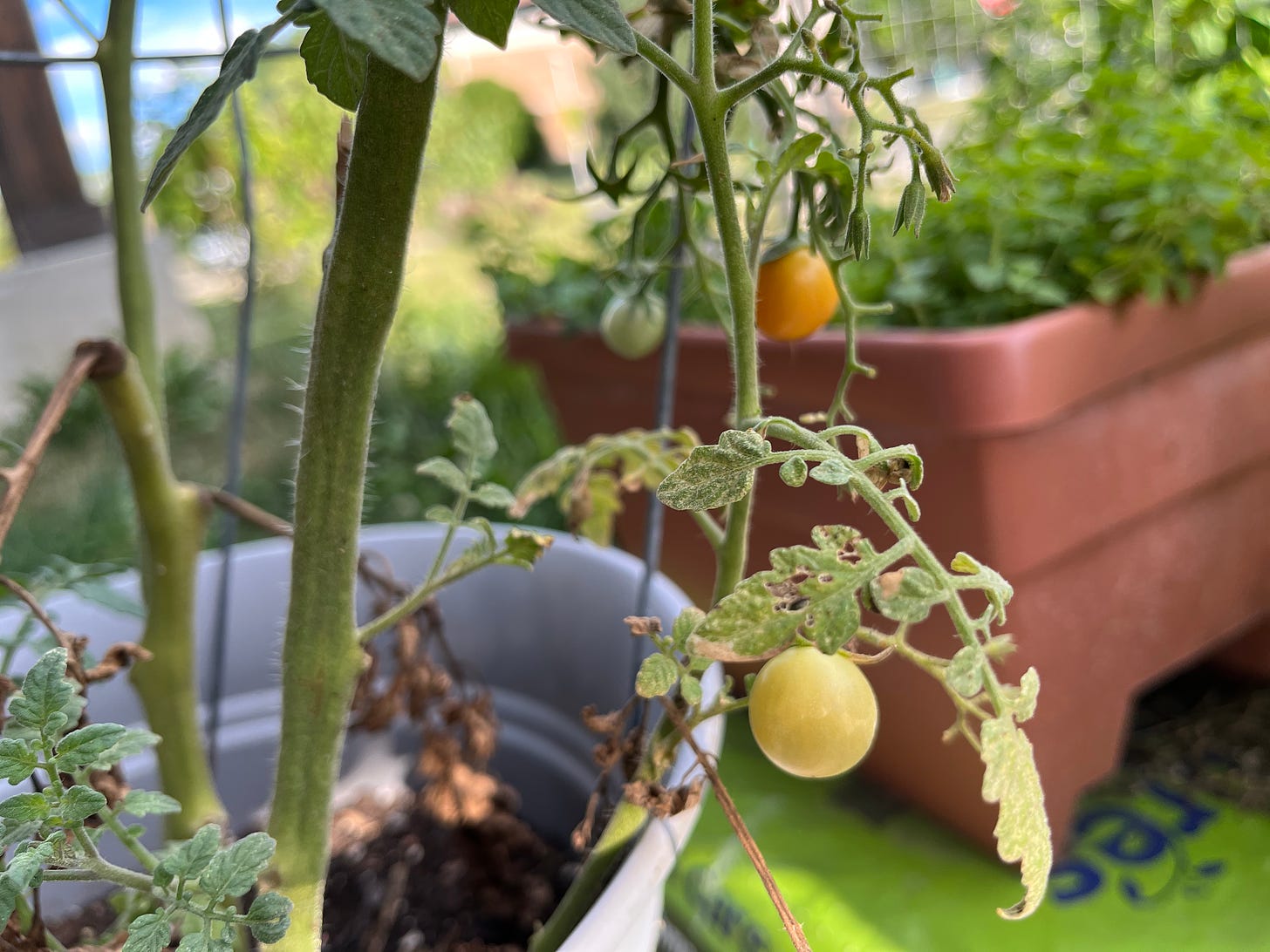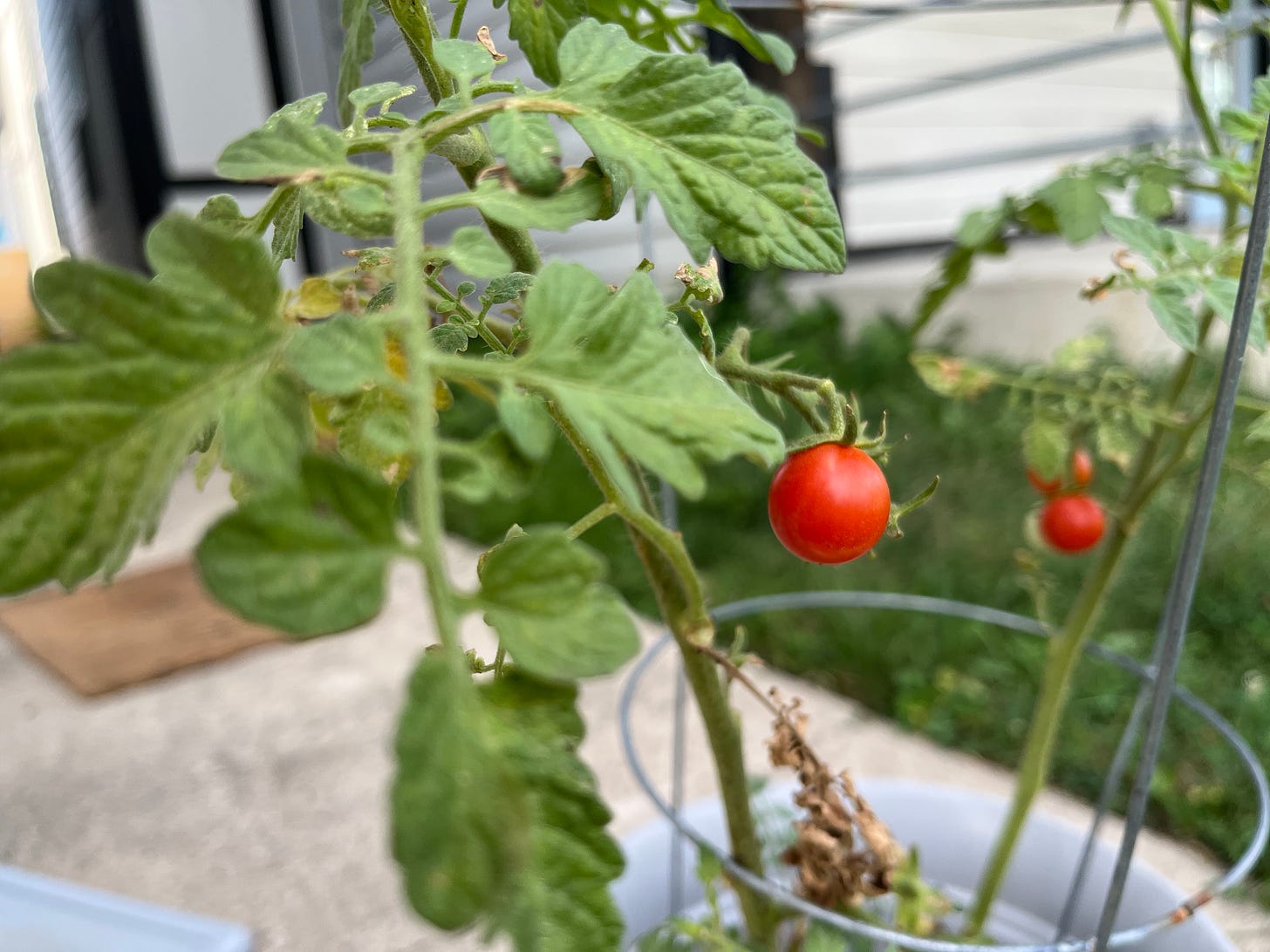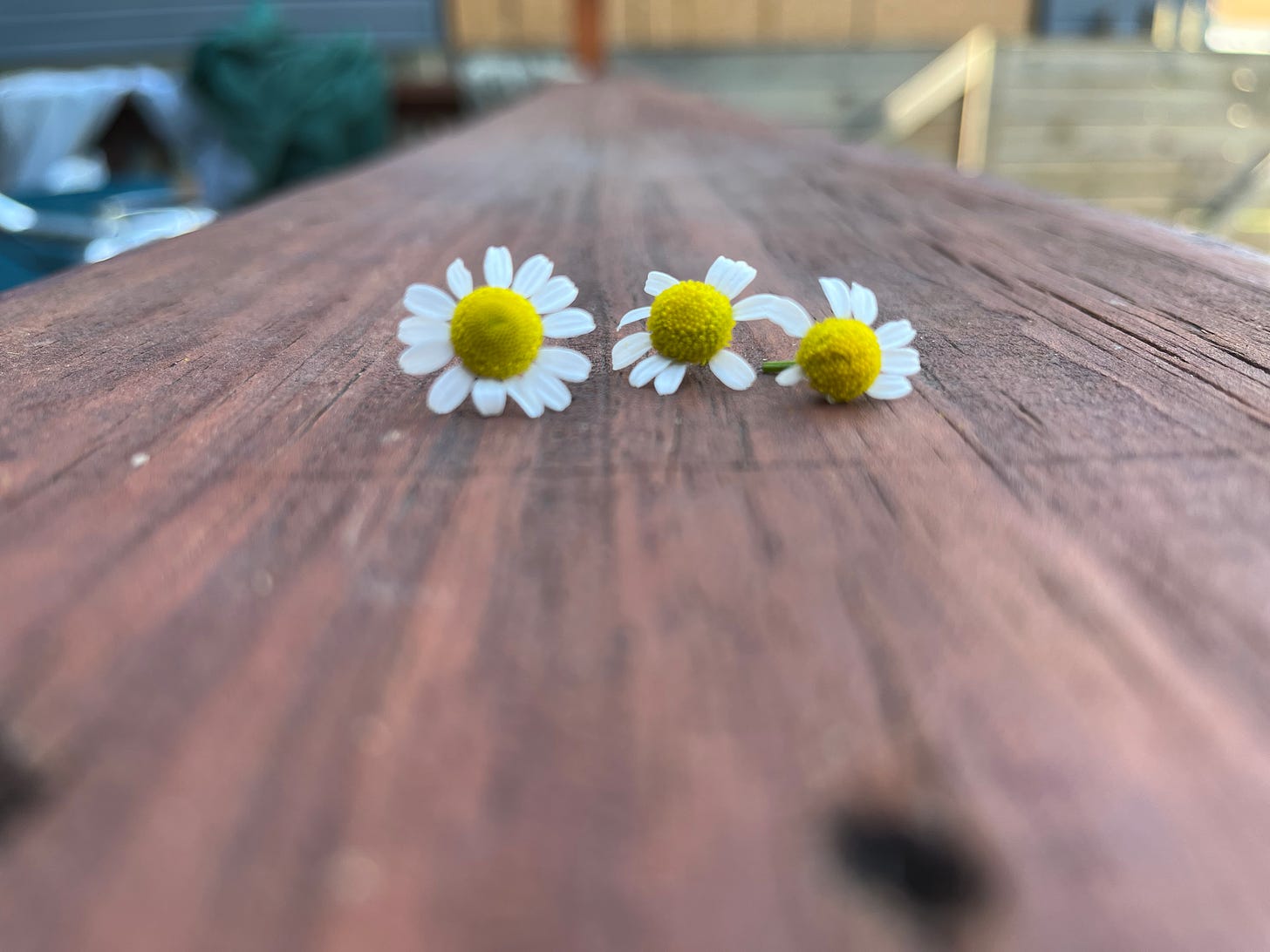I’m not having much luck with my tomatoes this year.
I, like many, took up gardening only since the start of the pandemic. With Evan’s help, I planted a 4x4 raised bed—right in my front yard like a crazy person. For a first-time gardener, my 2021 garden was pretty amazing. Nary a pest to be found. And all through July, August, and September, I harvested tomatoes and cucumbers, kale and parsley, mint and oregano, and more zinnias and cosmos than I had dreamed of.
This year is a different story. A squirrel got to my California Wonder plant early on, and it is just now (at the end of August) producing one tiny little bell pepper. I never got around to planting radishes or carrots. I planted borage without any sense of the humongous monster of a plant it would become, and it crowded out the kale and chamomile. And while I have more cucumbers and parsley than I know what to do with, it was the tomatoes I was most looking forward to. Alas.
My beefsteak and Roma plants died right after transplanting. I uprooted them and let clover take over. One cherry tomato plant remains, and a pretty sad one, at that—she’s always a bit yellow, and several branches have withered and died along the way. For a while, I doubted I’d harvest any fruit at all.
Imagine my surprise when we returned from our July vacation to find one beautiful, tiny red tomato. Since then, the sad tomato plant has produced perhaps a dozen cherry tomatoes…one or two at a time.
But these puny, scant tomatoes are magic.
Perfectly bite-sized, just on the coral-side of red, don’t bother rinsing, only seconds from vine to lips, bursting juice and seeds and pulpy flesh at the first bite, a flavor the absolute definition of “tomato” covering your tongue, can’t help but moan with delight, instantly you want another. You double check the plant—because perhaps there is just one more ripe fruit to pluck, but no, you knew it, the rest are not quite ready. Come back tomorrow.
It’s ecstasy. It’s torture.
One morning, when I went out to water the garden and found two tiny, nickel-sized tomatoes ready for the picking, I quickly took them both for myself before any children wandered outside. I grow greedy in the summertime.
Two of my best friends are homesteaders; another local friend is creating an amazing urban garden, complete with orchard and all manner of produce. I aspirationally follow gardeners on Instagram and YouTube. Their gardens are full of plants that tower far above their heads and climb up trellises. After harvest, their kitchen counters are blanketed by bulbous heirlooms, and as we speak, their pantry shelves are filling up with glass jars of sauce.
Last week at the grocery store, I tossed a $2.99 carton of tomatoes into my cart. I looked back at the stand holding dozens of these plastic containers and was stuck there for a moment, thinking of my struggling plant back at home, how it would be a miracle to glean even one full pint before first frost, and I marveled at the wonder that is the grocery store produce section. Suddenly, my plastic-wrapped pint felt so far removed from its source, and I despaired for all the years I didn’t stand in awe of a cherry tomato.
In chapter 15 of Luke’s Gospel, Jesus tells a series of three brief parables: the lost sheep, the lost coin, and the lost son. In the first, Jesus says, “Suppose one of you has a hundred sheep and loses one of them. Doesn’t he leave the ninety-nine in the open country and go after the lost sheep until he finds it?” I heard this story often as I grew up, and in my mind I answered Jesus’ rhetorical question with some variation of, “Yes, of course, shepherds love their sheep.” It was only later, as an adult, that I realized the answer for those original listeners was a resounding, “No.” It would be utterly foolish to leave behind 99 perfectly good sheep, leaving them vulnerable to predation and increasing the likelihood that they’d all go wandering off. In the world’s economy, 99 sheep are infinitely more valuable than one.
Through his irony, Jesus is trying to convey to them that God calculates value differently. God is not playing a number’s game, not worried about ROI, not thinking about practicality: God is out to prove that every single dang sheep is of infinite worth.
It’s the same with the coin and the son in the stories that follow: When you find something of great worth, no matter how small or negligible, rejoice.
After dropping off the kids at school this morning, I debated whether to help myself to the one orange cherry tomato on the branch. I decided to give it another day or two, and I am eagerly anticipating that delectable bite.
Tomatoes remind that all evidence to the contrary, the world is not beyond hope. Even when natural disasters seem to rage in every corner and I am flabbergasted by my grocery bill each week, there remains a 4x4 plot of soil here in my front yard. It is capable of producing one perfect, tiny tomato at a time, and then another, and then another.
I am not a homesteader, nor do I imagine I ever will be. We are committed to living here in the city, on a tiny lot where we could peer into our next door neighbor’s windows if we wanted. So I’ll stick with my 16 square feet for now and periodically Google “small space gardens.”
I’ll learn to trust that a life of abundance does not require an overwhelming harvest.
I’m not having much luck with tomatoes this year, but I am learning to rejoice.
The Good Stuff
In each newsletter, I like to share some of the good I’ve found out there in the world, inspired by Louisa May Alcott’s admonition: “Keep good company, read good books, love good things and cultivate soul and body as faithfully as you can.”
When I had COVID last month, I read Lessons in Chemistry by Bonnie Garmus. This book is an absolute 5-star read for me—I loved it and highly recommend. I can’t remember the last time I was so thoroughly surprised by the plot of a book—you think you’re getting one thing, but Garmus is as subversive as her protagonist.
Along with the rest of the Internet right now, I’m enjoying celebrating Serena Williams as she competes in the US Open—which she’s said will be her last competitive tennis event. The US Open was also her first major win—at only 19 years old. I absolutely love seeing things come full-circle. Will she win? We’ll see. She’s the greatest of all time either way.
College football is back this week! Go Gators! (Two sports references in one newsletter?! ‘Tis the season and I can’t help myself.)
My sister moved in with us this week, and she has never seen Ted Lasso. Seems like the perfect opportunity for a rewatch, right? I’m finding great delight in realizing that this show is even better the second time around—it may be solidifying it’s place as my favorite show ever. (And you know how hard it is for an Enneagram 9 to declare favorites!)
A late summer benediction
In a moment of weakness the other day, I came this close to baking up a batch of pumpkin muffins. I found some resolve in the end, but I am very cognizant of the fact that while we’re a full month into school here in Indianapolis, autumn has not yet arrived.
Here is a benediction for this particular in-between time.
May we resist the temptation to rush ahead, trusting that we can receive love and peace here and now.
On a day when everything feels a bit swampy–when to-dos pester like buzzing mosquitoes and burdens, like humidity, make it hard to take a deep breath–may we seek out small pleasures–great music, a cold drink, an afternoon nap, a long stretch. And for goodness sakes, eat a tomato. May we relish in the relief of every occasional cool breeze.
Wishing you grace and peace,
Lindsey





My cherry tomatoes are also doing well, giving a little gift every couple days. I am planning a bruschetta this week. And I put the book rec on my wishlist! Thank you!